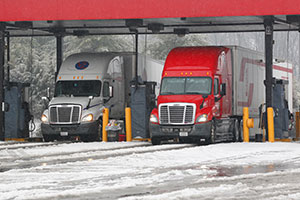Diesel Notches Third Consecutive Decline, Slips 0.7¢ to $2.562

The U.S. average retail price of diesel slipped 0.7 cent to $2.562 a gallon as crude oil prices remained near $52 a barrel and U.S. rig counts increased.
It was diesel’s third decline after six consecutive weekly increases, the Department of Energy reported Jan. 30.
Diesel cost 53.1 cents more than it was a year ago, when the price was $2.031.
All areas reported a lower average price for diesel except the Lower Atlantic and California regions, where prices, respectively, rose 0.3 cent and 0.4 cent, DOE’s Energy Information Administration reported.
“[Diesel] fuel was a headwind in the fourth quarter of roughly three cents of earnings per share. We have assumed that fuel prices will increase gradually throughout 2017 and thus will be a headwind throughout the year,” Ginnie Henkels, CFO, Swift Transportation Co., said in a fourth-quarter earnings call Jan. 27.
Swift reported diluted earnings per share in the fourth quarter of 38 cents, compared with 51 cents in the 2015 period.
Average retail diesel prices have risen 17.3 cents a gallon since Oct. 3 when they were $2.389, according to DOE.
Swift Transportation ranks No. 6 on the Transport Topics Top 100 list of the largest U.S. and Canadian for-hire carriers.
The U.S. average price for regular gasoline fell 3 cents to $2.296 a gallon, according to EIA.
The average weekly gasoline price dropped in all regions except on the West Coast, where it rose 0.2 cent to $2.678 a gallon.
Also, West Texas Intermediate crude futures on the New York Mercantile Exchange closed at $52.63 per barrel Jan. 30, compared with $52.75 on Jan. 23.
Meanwhile, U.S. motorists probably would foot the bill for President Donald Trump’s 20% border-wall tax as domestic refiners reliant on Mexican crude pass on the cost, according to Bloomberg News.
American companies imported about $14 billion in oil and related products from Mexico in 2015, government data show, according to Bloomberg.
The wider range of countries that a tax would apply to would increase the hit to American drivers, Bloomberg said.
“Assuming they are proposing to impose a 20% tax on imports on countries from which we run a trade deficit, then we can expect gasoline prices to rise 30 cents per gallon,” Phil Verleger, president of the economic-consulting company PKVerleger told Bloomberg by phone from Carbondale, Colorado.
At the same time, the U.S. rig count on Jan. 27 reached 712, an increase of 18 from the week before, and 93 more than a year earlier, according to the oil field services company Baker Hughes.
Baker Hughes ranks No. 14 on the Transport Topics Top 100 list of the largest private carriers in North America.




